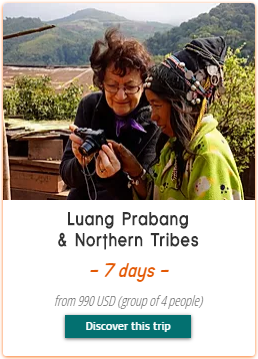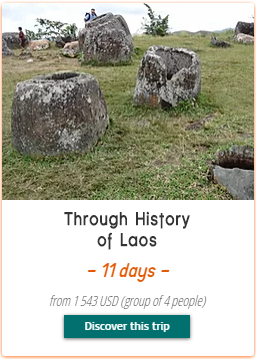Laotian myth: Khun Lou & Nang Oua, the Laotian version of « Romeo & Juliette »
- Nov 22, 2019
- 3 min read
Updated: Jul 24, 2020
Every civilization has its stories and legends transmitted from generation to generation. Laotian culture is no exception to the rule. Deep into the Buddhist tradition, its stories are about love, divine spirits, fights or nature. At ORLA tours, we believe that these little myths are very important to the local culture. That's why we devote a series of articles to it.

For this fourth one, we’ve decided to tell you the story of the Lao “Romeo & Juliette”.
A couple, deeply in love, with a tragic destiny. Spirits, karmas, curse, reincarnation, this legend is at the heart of Buddhist belief. Enjoy the reading!
Once upon a time, a long time ago, the king and queen of the Kasi Kingdom, south of Luang Prabang.
The queen gave birth to a wonderful boy: Khun Lou. Following this happy event, they asked a diviner to predict his future. Rather strange, right? Well not really, it is a tradition that is still present today in Laos. Long story short, the omens of the shaman were not really good: "he will not die of illness or combat, but he will die young". What to do against that? The king and queen decided to dedicate all their servants to the protection of their child.
Meanwhile, another happy event was celebrated in the neighboring kingdom of Nakhorn Kai. A girl, this time, Nang Oua. His mother, the queen, was a great friend of the Kasi kingdom. The two queens had promised each other to marry their children if they gave birth to a boy and a girl.

As the years passed, Nang Oua turned into a very pretty young woman. Khun Lou, the prince of the neighboring kingdom, fell in love. They became lovers and promised themselves never to separate again.
Everything’s going for the best right? Umh ... not really. Because, a union of interest prevailed over a wedding of love. And that's why Nang Oua's mother intended her daughter to marry Khun Lang. This king was much richer than Khun Lou and it was a sufficient criterion.
The queen therefore set a wedding date for her daughter. When Nang Oua heard about it, she said, "rather die than marry him"! Well ...
Meanwhile, Khun Lou's mother traveled to Nang Oua’s kingdom. Why is that? To ask for the hand of the daughter in the name of her son. But the girl was already engaged to another! What a disappointment. Especially since a promise had been made, do you remember? The two mothers had sworn to marry their children. But the thirst for money had decided otherwise.
Disappointed by this betrayal, Khun Lou's mother had not said her last word. She organized magical ceremonies to ask the spirits what they thought. Should the lovers live together? Were their karmas correctly synchronized? The answer was no. Their lives were linked but their karmas kept them apart.

Nang Oua was desperate. Her fate was sealed. She had to marry a man she did not want of and say goodbye to the one she loved. It was too much. She decided to escape in the woods to put an end to her life. On the way, she passed by two salikas, sacred blackbirds. They tried to dissuade her from committing suicide. In vain ... She kept on wandering and arrived at the bottom of a tree planted by an evil spirit. Seeing her, he bent over to tie her rope. He got up again, killing the princess instantly.
Khun Lou, her lover, heard about it. His despair was immense. He decided to end his days to find her in heaven. He took his sword then cut his throat. The two queens lost their children. They gave up their mutual promise in favor of money. And this choice had caused the loss of their kids. They decided to give up their respective kingdoms to become nuns.
Here is the end of the legend of Nang Oua and Khun Lou. So, what morality to learn from it?
As is often the case in Laotian tales, accepting one's fate is part of the teaching. We also find this fatality in the myth of Bachieng. Another possible lesson is the strength of karmas. Good actions attract good karmas, and vice versa. This "counter" follows you through your reincarnations. There is therefore interest in behaving well to hope for a happy future life. Here we are at the heart of Buddhist philosophy ...
















Comments